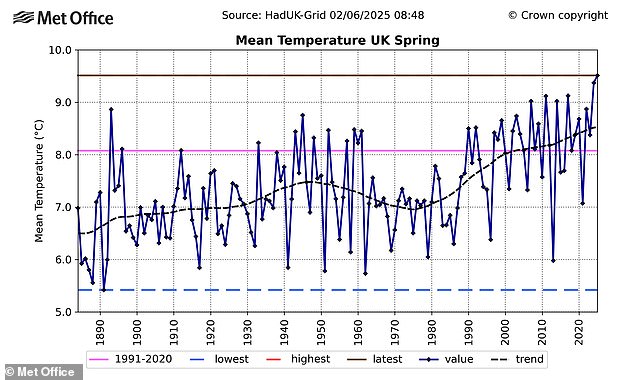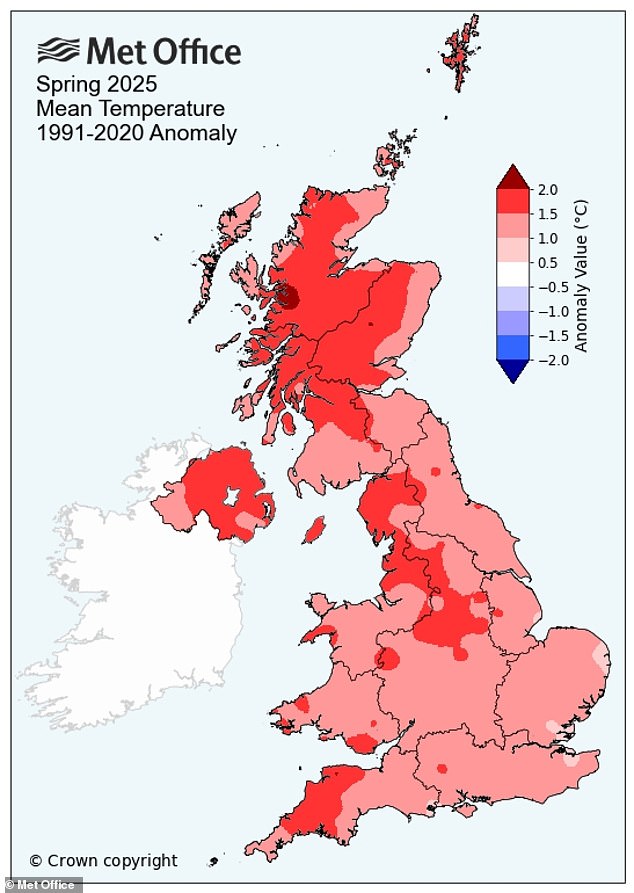Climate scientists have called for ‘immediate action’ to tackle global warming -following the news that Britain has recorded its hottest spring on record.
According to the Met Office, which has been recording temperature data since 1884, spring 2025 was officially the warmest and sunniest on UK record.
The three months running from March to May marked an ‘unprecedented season of warmth and sunshine’, it said on Monday.
Many Brits enjoyed the balmy weather, with some even braving the UK beaches for a dip.
However, Alec Hutchings, WWF’s chief climate advisor, says the record confirms that climate change is ‘here now and needs immediate action’.
‘This new Met Office data is a stark warning that climate change is no longer a distant threat,’ he said.
The expert called for more ‘climate action’ from the UK government to reduce the country’s greenhouse gas emissions.
‘The UK Government needs a clear, credible plan to reduce emissions and put people at the heart of climate policy,’ he added.

The UK experienced its warmest spring on record and its driest in more than 50 years, the Met Office said on Monday. Pictured, people enjoy the warm weather on Bournemouth beach in May 2025

As Britain sweltered though summer-like temperatures this spring, the new record for spring may not come as a surprise. Pictured, Greenwich Park, London, May 31, 2025

This graph shows spring’s mean temperature for the UK since 1884, when the Met Office’s records began. Note the peaks since 2000 – a ‘sign of our changing climate’
‘It’s time to unlock the investment to a low-carbon future and turn the temperature down.
‘Climate action is an economic opportunity to futureproof our economy and support businesses and communities of the future.’
On Monday, Met Office revealed that spring 2025 – which it defines as the three months from March to May – has been the warmest and sunniest on UK record (since 1884).
This spring’s average temperature of 49.1°F (9.51°C) surpassed the long-term climatological average by 2.5°F (1.4°C).
It smashed the previous record, set in spring 2024, when the average temperature was 48.8°F (9.37°C).
Stephan Harrison, Professor of Climate and Environmental Change at the University of Exeter, said the new record is ‘absolutely consistent’ with the rapid rise in global temperatures as seen in recent decades.
‘The effects have been most marked in the Scottish mountains where almost all the winter snow has already melted, and this is extremely unusual for so early in the year,’ he told MailOnline.
Professor Harrison added: ‘It is extremely unlikely that spring temperatures were warmer than this in the years before records were kept as past centuries were much cooler than now.’

All four nations also recorded their highest spring mean temperature, with Northern Ireland and Scotland recording notably high temperatures, up 2.88°F (1.6°C) on average

Spring 2025 is now the fourth sunniest season overall for the UK, with only three summers sunnier since 1910. Pictured, walkers out in the early morning sunshine by the woods in Oxfordshire, June 2, 2025
Worryingly, eight of the 10 warmest UK springs have occurred since the year 2000, while the three warmest springs have all occurred in the last decade (2025, 2024 and 2017).
Professor Richard Allan, professor of climate science at the University of Reading, said the UK ‘is heating up along with the rest of the planet’.
‘Although the fickle nature of weather patterns means there can be large variation in temperature and rainfall from one year to the next, the warming trend over more than a century is clear evidence that the UK is heating up along with the rest of the planet,’ he told MailOnline.
‘A warmer world brings with it a greater severity of hot, dry and wet weather extremes as well as wilder swings between them and a slow inexorable rise in sea levels.
‘The only way to limit global warming and damaging impacts on people is through collaboration across all sectors of society to cut heat trapping greenhouse gas emissions.’
Dr Vikki Thompson, scientist at the Royal Netherlands Meteorological Institute, agreed it is ‘highly unlikely that warmer springs occurred in the UK in the last few millennia’.
‘Relatively warm periods within the last few thousand years were not as warm as we have experienced over the past decade,’ she told MailOnline.
The warm and dry conditions were caused by a ‘blocking’ weather system where high pressure lingers over the UK, she added.
Dr Thompson continued: ‘Though a warm, dry spring may seem very pleasant, it will negatively impact many sectors of society.
‘Farmers’ harvests will likely be impacted, there is potential for summer drought, and conditions are ideal for the ignition and spread of wildfires.
‘The UK’s climate is set to continue to warm, with a higher risk of extreme weather, sea level rise, and other climate impacts.
‘This highlights the need for society to adapt as well as decrease our emissions of heat-trapping gases.’
Also this spring, the UK had 653.3 hours of sunshine – which the Met Office said was 43 per cent above the long-term average.
Spring 2025 has outshone all previous springs since 1910 and seven of the UK’s ten sunniest springs having occurred since 2000.
Very low rainfall this spring has also resulted in challenging conditions across much of the country for agriculture and water resources, especially in England.
Spring 2025 still ranks as the sixth driest spring since this series began in 1836, with just five inches (128.2mm) of rainfall – approximately 40 per cent below the long-term average and the driest spring in more than 50 years.

A woman enjoys the warm spring weather in a beach chair Green Park in London, April 4, 2025
‘Recent decades have been warmer, sunnier, and often drier than the 20th century average,’ said Met Office scientist Emily Carlisle.
‘What’s particularly notable about spring 2025 is the combination of record warmth and sunshine, alongside very low rainfall.
‘This spring shows some of the changes we’re seeing in our weather patterns, with more extreme conditions, including prolonged dry, sunny weather, becoming more frequent.’
The unusual warmth hasn’t been limited to land, as waters around the UK have experienced a marine heatwave.
Sea surface temperatures around the UK reached record highs for April and May, with some areas as much as 7.2°F (4°C) warmer than usual.
Looking forward, summer 2025 could beat 2018 to become the UK’s hottest summer on record, bringing heatwaves and droughts.









